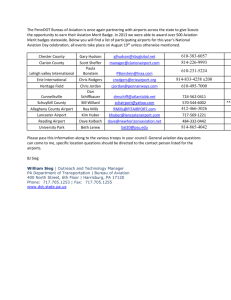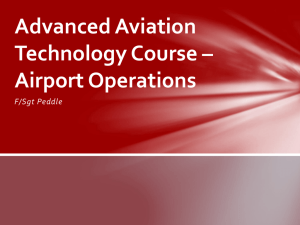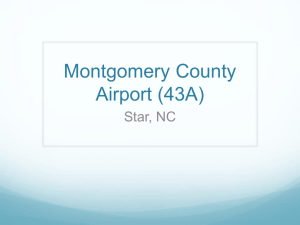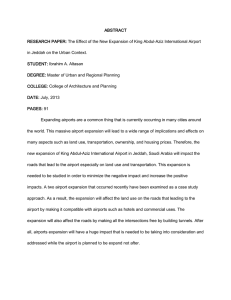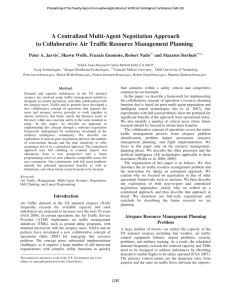Aviation Growth in China: Challenges and On-going efforts
advertisement
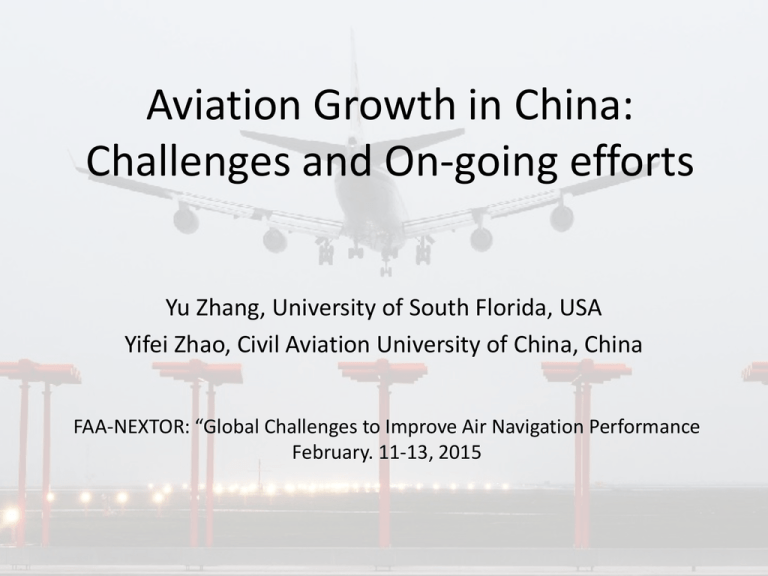
Aviation Growth in China: Challenges and On-going efforts Yu Zhang, University of South Florida, USA Yifei Zhao, Civil Aviation University of China, China FAA-NEXTOR: “Global Challenges to Improve Air Navigation Performance February. 11-13, 2015 Civil Aviation Transportation Turnover 2006-2013 Unit: 0.1billion ton km Passenger Traffic 2009-2013 Unit: 0.1billion Air Cargo Traffic 2009-2013 Unit: 10 thousand ton Fleet Size 2006-2013 China’s Air Travel Demand Is Expected To Grow At Nearly 8% Per Annum Through 2028 Source: Boeing Current Market Outlook China’s Air Transport Fleet Will Triple Over The Next 20 Years And Receive 13% Of Total Deliveries Source: AeroStrategy estimates, data includes airliner and freighter deliveries, RJ excluded, 2008. New Airplane Deliveries to China: 2013-2032 Source: Boeing, 2013. http://boeing.mediaroom.com/2013-09-05-Boeing-Forecasts-Chinas-Fleet-to-TripleOver-Next-20-Years Challenges - Major Infrastructural Constraints •To the end of 2013, China has 193 commercial airports. By 2020, the number is estimated as 244. •Lack of military-civil aviation collaboration mechanism. Source: Project 2049 Institute, ”China’s Commercial Aviation Sector Looks to the Future.” China's 12th Five-Year Plan (2011-2015) Challenges – Imbalanced Air Route Network and Concentrated Traffic in East Coast of China The “golden triangle” air corridors linking Beijing, Shanghai, and Guangzhou are reportedly near saturation. And most of large airports in China is reaching their capacities. 在各机场中,年货邮吞吐量达到 1万吨以上的有50个,完成货邮 吞吐量占全部机场的98.5%。 所有通航机场中,年旅客吞吐量达到 100万人次以上的有61个,完成旅客 吞吐量占全部机场的95.4%;年旅客 吞吐量达到1000万人次以上的有24个, 完成旅客吞吐量占全部机场的76.8%。 2014/9/24 11 Challenges – Competition from High-Speed Rail • Guangzhou– Wuhan: No. of flights reduced and air ticket prices decreased. • Xian–Zhengzhou: All the original scheduled flights were cancelled. • Chengdu– Chongqing: Air traffic dropped sharply and many airlines stopped their operation entirely between these two cities. Challenges – Shortage of Work Force • Short of pilots, mechanics, air traffic controller and management personnel in air transportation. • To the end of 2012, there are 8518 captains and 13176 co-pilot for commercial airlines in China. – However, 10% of the captains are taking management role and fly limited hours. – Many of the captains were newly promoted and play the role in half. • For air traffic controller, the educational system is different. – Undergraduate degree. – Lack of enthusiasm and motivations due to the reduction of salary starting from last year. – The training time for professional skills is limited. Challenges – Financial Deficit of Medium to Small Airports • The ownership of airports transferred from central government to provincial government in 2002, except Beijing Capital International Airport and Lhasa Gonggar Airport at Tibet. • Although there is discretionary funding for the development of medium to small airport from the central government, local authorities are playing more pivotal role. The local government is facing financial challenges overall. • The application for airport project is tedious and the review and approval process takes long time. • 70-80% of small airports are red on the balance sheet. Challenges – Lack of Collaborative Decision Making in Air Traffic Management • There is no air traffic control system command center (ARTSCC) in China. • The demand control is done by entrance rate from one center to the other. • Temporary air routes according to the restricted airspace. No national playbook with pre-validated Severe Weather Avoidance Plan (SWAP) routes in advance. • Rerouting and diverging are only permitted once the flights in the air. • Designated diverging airport but the communication for realizing the diverge is tedious and troublesome. • Lack of performance evaluation and analysis. On-going Efforts – Infrastructure • National Airspace Administration Committee • Air traffic management summit to discuss the possible solutions and models that can be followed • More new airports will be constructed during “thirteen five”, including the second airport in Beijing. • Exploring the private-public partnership (PPP) for airport development. • Reformation of the management of low altitude airspace for GA and UAS. On-going Efforts – Intermodality • Air-Rail Express: For busy airport such as Beijing Capital International airport, passengers are encouraged to take flights at Shijiazhang Zhengding International by taking high speed rail to Tianjin. Tianjin airport offer free shuttle to pick up passengers from the rail station and airlines sometime reimburse the train tickets. On-going Efforts – Education for Next Generation Work Force • Major projects for university infrastructure construction and facility improvement: 3.4 billion Chinese Yuan (~$0.6 billion). • Sino-European Institute of Aviation Engineering (SIAE) • Fellowship for short-term study-abroad, ACP training On-going Efforts – Air Traffic Flow Management • Regional offices are working with technology companies, national research institutes to develop ATFM tools and platform. • US-China Aviation Cooperation Program (ACP) • Memorandum between CAAC and FAA on ATFM • Research centers sponsored by CAAC and NATC have been established at CAUC and NUAA. • Performance evaluation and analysis Yu Zhang yuzhang@usf.edu Yifei Zhao yifei6666@sina.com Large Airports with More Than 100 million Passenger Throughput in Mainland China
